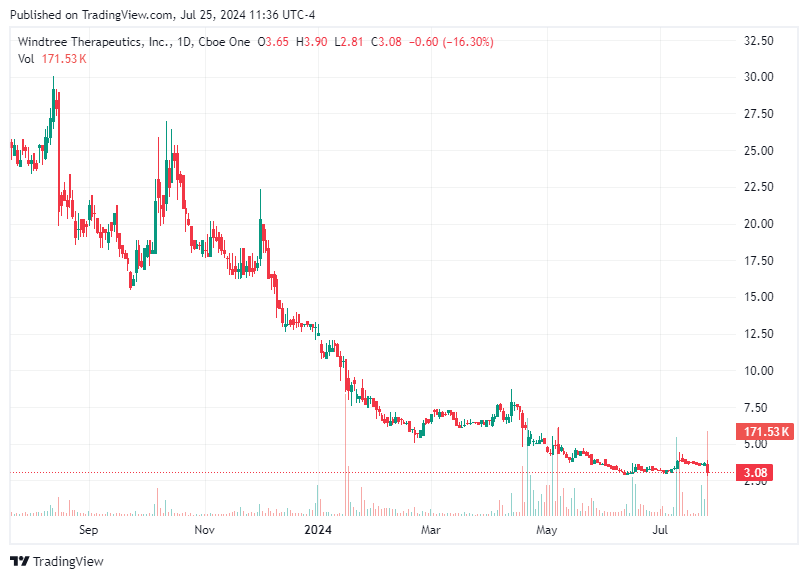Biotechnology Company Provides Major Update For Heart Failure Treatment Trial
Windtree Therapeutics: Advancing Istaroxime Clinical Development.

Disclaimer: The following article is a detailed exploration of Windtree Therapeutics’ recent update on the clinical development of istaroxime and its upcoming clinical trial data. This article does not constitute medical advice or an endorsement of any treatments discussed. It is intended for informational purposes only.
Real-time information is available daily at https://stockregion.net
Windtree Therapeutics, Inc. (“Windtree” or the “Company”), listed on the Nasdaq Capital Market under the ticker symbol WINT, has recently provided an update on the clinical and business development of istaroxime. This innovative biotechnology company focuses on developing therapies for critical conditions and diseases, emphasizing early and late-stage treatments.
Phase 2 SEISMiC Extension Study
Istaroxime is a novel first-in-class therapy aimed at addressing acute heart failure (AHF) and early cardiogenic shock. It functions by enhancing systolic contraction and diastolic relaxation of the heart, while also increasing blood pressure and maintaining or improving renal function. To date, istaroxime has been evaluated in three positive Phase 2 trials involving patients with AHF and early cardiogenic shock. These trials have demonstrated promising results in improving cardiac function without an associated increase in cardiac arrhythmias, a potentially important differentiator from other inotropes and vasopressors currently in use.
The Company recently announced that it expects to complete enrollment for the Phase 2 SEISMiC Extension Study in the next few weeks, with topline data anticipated by the end of this quarter. This study builds upon the positive outcomes of the previous SEISMiC study and focuses on dose optimization and additional characterization of SERCA2a effects for Phase 3 planning. The extension study aims to enroll up to 30 patients with SCAI Stage B early cardiogenic shock due to AHF.
In this study, hospitalized patients will be administered two different dosing regimens of istaroxime compared to a placebo. The first group will receive a decreasing dose of istaroxime over time, while the second group will receive a consistent dose throughout the treatment period. Notably, the dosing duration will be extended to up to 60 hours, compared to the 24-hour treatment period in the previous SEISMiC study. This extension is expected to provide additional benefits and help determine the optimal dosing regimen for future late-stage trials.
The study also gathers detailed information on heart function, particularly related to the SERCA2a mechanism of action.
Parallel Study in SCAI Stage C Cardiogenic Shock Patients
Another crucial aspect of the Extension Study is the assessment of istaroxime's effects on blood pressure and cardiac function. The two dosing regimens are evaluated to observe improvements similar to those seen in the initial SEISMiC study. This detailed examination will provide valuable insights into the efficacy and safety profile of istaroxime, guiding future clinical developments.
Windtree Therapeutics is also progressing the start-up of a parallel study involving SCAI Stage C cardiogenic shock patients, who represent a more severely ill population than those studied in the initial SEISMiC trial. This Phase 2 study will recruit up to 20 patients with SCAI Stage C cardiogenic shock due to acute decompensated heart failure, evaluating the effects of istaroxime in addition to standard-of-care therapies such as inotropes or vasopressors.
This double-blinded, placebo-controlled study will assess the primary endpoint of systolic blood pressure (SBP) area under the curve over the first six hours of treatment. Following the initial six-hour assessment, standard-of-care therapies will be withdrawn, allowing for an evaluation of istaroxime's impact in isolation. Other critical measurements include SBP changes at specified time points, the vasopressor-inotrope score, progression to more severe stages of cardiogenic shock (SCAI Stage D or E), time to treatment failure, arrhythmia assessments, days alive and out of the hospital through day 30, physiologic measures such as cardiac index, and length of stay in both the ICU and hospital.
Implications for Future Research and Treatment
The detailed data collected from these trials will inform the design and implementation of future Phase 3 trials, aiming to solidify istaroxime's role in the therapeutic landscape.
By extending the dosing duration and optimizing the dosing regimen, Windtree Therapeutics aims to maximize the therapeutic benefits of istaroxime while minimizing potential risks. The focus on detailed cardiac function measurements and the comprehensive assessment of patient outcomes will contribute valuable information to the broader scientific community and may pave the way for new treatment protocols.
Windtree Therapeutics’ commitment to advancing istaroxime through rigorous clinical trials reflects the company's dedication to developing innovative therapies for critical cardiac conditions. The Phase 2 SEISMiC Extension Study and the parallel study in SCAI Stage C cardiogenic shock patients represent crucial steps in this journey. As the Company continues to collect and analyze data, the insights gained will play a pivotal role in shaping the future of cardiac care.
Disclaimer: The information provided in this article is for educational purposes only and should not be construed as medical advice. Always consult with a healthcare professional for medical guidance and treatment options.
Real-time information is available daily at https://stockregion.net

